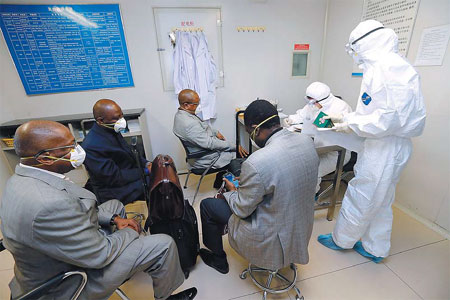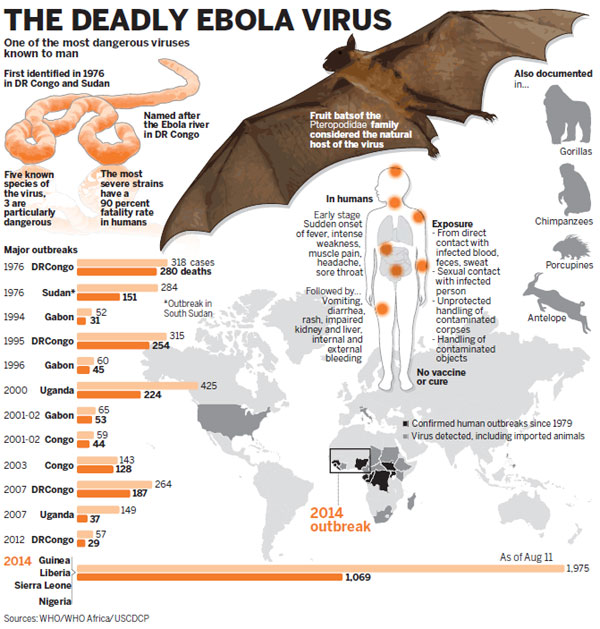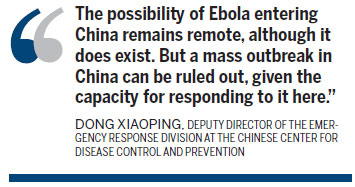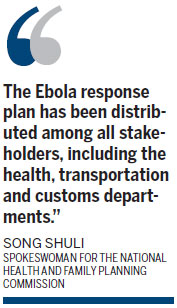We're ready if Ebola arrives, say health official

Quarantine officers with the entry-exit inspection and quarantine bureau at the Beijing Capital International Airport give body temperature tests to four passengers from Nigeria on Thursday. They all passed the test and were allowed through the border. Shen Bohan / Xinhua
China acts as killer virus takes heavy toll in West Africa, reports Shan Juan in Beijing.
China is on guard against the Ebola virus and well prepared to respond to any threat from it, health officials say as global concerns mount over the outbreak in West Africa.Dong Xiaoping, deputy director of the emergency response division at the Chinese Center for Disease Control and Prevention, said the nation is far from the areas affected and there are no direct flights to these countries.
"The possibility of Ebola entering China remains remote, although it does exist," Dong said. "But a mass outbreak in China can be ruled out, given the capacity for responding to it here."
The latest Ebola outbreak, the largest of its kind and the first in West Africa, has claimed more than 1,000 lives in four countries.
Last week, the World Health Organization declared the epidemic a "public health emergency of international concern".
Dong said, "If there are isolated cases, we will be capable of 'contact tracing' and further stopping the spread of the virus."
Healthcare professionals and hospitals also stand ready to treat patients and carry out infection control measures if the need arises, he said.
Ebola virus disease is one of the world's most virulent diseases. The infection is transmitted by direct contact with the blood, body fluids and tissues of infected animals or people.
The latest outbreak, which started in February in Guinea in West Africa, has since spread to neighboring Liberia, Sierra Leone, and Nigeria, whose health systems are too weak to handle the scourge.
The WHO warned that the possible consequences of any global spread of Ebola are serious in view of its virulence and has called for a coordinated international response to stop and reverse any such potentiality.
Response plan in place
China's top health authority, the National Health and Family Planning Commission, issued an Ebola hemorrhagic fever response plan on July 31.
Under the plan, local medical institutions must use an online system to report any confirmed or suspected Ebola cases directly to the commission within two hours. The requirement makes it one of the most stringent of its kind involving infectious diseases.
Other key information provided cover clinical symptoms, virus screening and even the disposal of the bodies of infected victims.
"The Ebola response plan has been distributed among all stakeholders, including the health, transportation and customs departments," said Song Shuli, the commission's spokeswoman.
Song said the response includes checks and preparations in bio-safety and security that involved mass events like the 2008 Beijing Olympics.
The country already has in place action plans to deal with Ebola, even though there have been no outbreaks of it nor sample virus strains for research, she said.
He Xiong, deputy director of the Beijing CDC, agreed.
"A sound health emergency preparedness plan enabled by multidepartment collaboration is in place in China as a legacy of the country's response to major threats like SARS in 2003," He said.
Chinese healthcare professionals help out at the front line
On March 17, Cao Guang was working as usual at the China-Guinea Friendship Hospital at Conakry, capital of Guinea in West Africa.
The Chinese healthcare professional conducted a medical examination on a 44-year-old patient, who was later diagnosed as the first person infected by the latest Ebola virus outbreak.
Without realizing the severity of the situation, that first Ebola sufferer infected a total of nine medical workers, including Cao. Six of those infected later died.
Figures from the World Health Organization showed that 1,069 people among 1,975 suspected or confirmed cases of the Ebola virus in Guinea, Liberia, Sierra Leone and Nigeria have died from the disease. Cao was one of two Chinese medical workers who had come into contact with an Ebola patient. The two were not infected with the virus and Cao had to go through a 21-day quarantine in Guinea before returning to his work at the China-Guinea Friendship Hospital.
Cao, who is one of 19 medical staff sent to Guinea from Beijing Anzhen Hospital, has recorded his "special experience" in fighting the virus on his micro blog. His account has become a major hit among Chinese netizens and more than 20,000 fans are following his entries.
Guinea is the first West African country to suffer the latest Ebola outbreak, and latest figures showed that 310 of 410 Ebola cases detected in Guinea had died. Kong Qingyu, head of the Chinese medical assistance team in Guinea, said they have received 12 infected patients in the past 20 days. The death rate is high but the Chinese team is working hard on an emergency plan.
China have been sending assistance teams to Guinea since June 1968 and Kong's team is the 23rd one. Besides Guinea, there are 38 Chinese medical workers fighting at the forefront of the war against the Ebola virus in West Africa. The teams currently have no plans to evacuate the affected areas. "It is a doctor's duty to heal the wounded and comfort the dying," Kong said.

Over the years, China has gradually formed and constantly fine-tuned its emergency response and infection control system to deal with threats like the SARS epidemic and H1N1 flu pandemic scare.
The system forms the bedrock of any response to outbreaks and includes early detection, isolation of cases, contact tracing and monitoring, and rigorous procedures for further infection control, He said.
For example, hospitals can alert public health departments of suspicious cases or report confirmed ones.
In return, the health departments help update overall outbreak development and devise or adjust response strategies.
"Such cooperation was not well-implemented before SARS," said Xu Qian, head of the infectious disease department of the China-Japan Friendship Hospital, which treated SARS patients during the epidemic that killed 349 people on the Chinese mainland alone.
"Infection control awareness has largely been enhanced since SARS and high alert at the front lines of our department towards any infections including Ebola has become routine," she said.
Even before the commission issued its emergency response plan, her hospital had "taken actions like staff training and checking patients with fever for background information as if they had traveled to the affected areas".
Hospitals must also report cases of patients suffering unexplained fevers to the CDC, under a new mechanism that was set up following SARS to help detect potential outbreaks, she said.
"Hospitals have been gradually taking increasing public health responsibilities ever since," she said, adding that China is ready to respond to any outbreaks.
A consensus that everyone shares public health responsibility has gradually been reached nationwide, He said.
Government agencies including health, tourism, customs and transport will hold regular talks and set up cooperation mechanisms in case of any viral outbreak, he said.
Guarding against virus
Chinese quarantine authorities have strengthened inspections at its borders as part of measures to prevent the Ebola virus from spreading into the country.
On Aug 4, the General Administration of Quality Supervision, Inspection and Quarantine said in a work notice that it will implement stricter inspections on inbound airlines from regions affected by Ebola, and step up sanitary measures on incoming vehicles and goods.
At Baiyun Airport in the southern boomtown of Guangzhou, which receives more than 1,000 passengers from Africa daily, routine taking of passengers' body temperatures has been practiced strictly.
"Those whose temperature is higher than 37.5 C might be put under medical observation to clear them of Ebola infection," said airport employee Chen Yanling.
In late July, a Hong Kong woman who showed symptoms similar to those of the Ebola virus after visiting Kenya tested negative for the disease but still caused brief panic.
Sierra Leone's National Olympic Committee said its delegation for the
upcoming youth games was asked not to travel to China because of an outbreak of
Ebola, The Associated Press reported. The president of the committee, Patrick Coker, said the Chinese embassy in
Sierra Leone said the delegation "might find themselves in a troubled and
awkward situation once they get to China's port of entry".
The president of the committee, Patrick Coker, said the Chinese embassy in
Sierra Leone said the delegation "might find themselves in a troubled and
awkward situation once they get to China's port of entry".
The Youth Olympics begin on Saturday in Nanjing, capital of Jiangsu province. The 12-day event features more than 3,000 athletes from around the world, from the ages of 15 to 18.
Seven Chinese medical staff working in the Sierra Leone-China Friendship Hospital, quarantined after treating Ebola patients, have also shown no Ebola symptoms and their conditions were stable, an official with the Chinese embassy told Xinhua News Agency on Tuesday.

The quarantine of another member of the Chinese medical team in Sierra Leone was concluded after he was checked and ruled out from being infected with the virus, the leader of Chinese medical team, Wang Yaoping, told Xinhua.
Tom Frieden, director of the US Centers for Disease Control and Prevention, said: "The bottom line with Ebola is we know how to stop it: traditional public health. Find patients, isolate and care for them; find their contacts; educate people; and strictly follow infection control in hospitals. Do those things with meticulous care and Ebola goes away."
Xiang Nijuan, a researcher of the China CDC, agreed and said that the country's technical guidelines concerning contact tracing and management, lab testing and patient transfer will soon be distributed to guide the overall response.
For instance, meticulous contact tracing means finding everyone who may have been exposed to a person with Ebola and checking for signs of illness every day for 21 days, she said.
The Ebola virus can remain in the body for weeks before making a person sick. If the contact develops a fever or other Ebola symptoms, that person is isolated and treated and the cycle starts again - and all of that person's contacts must be traced and followed for 21 days.
Helping affected areas
WHO Director-General Margaret Chan also called for effective intervention and cooperation at the international level, with demand for response to the outbreak outstripping local capacity in West Africa.
Without global partnership, the worst Ebola outbreak in history in terms of scale and severity might be catastrophic and spread to other places, she warned.
In response, China announced last Thursday humanitarian aid supplies worth 30 million yuan ($4.9 million) for three Ebola-hit countries to help contain the outbreak.
Three public health expert teams have also been dispatched to Guinea, Liberia and Sierra Leone to help distribute supplies and guide local Chinese communities on self-protection.
About 20,000 Chinese nationals live in the three countries, figures from China's Ministry of Commerce showed.
More clinical infectious disease doctors from Beijing and Hunan province are also preparing to medically assist the affected countries, Beijing health authorities said.
Chinese medical teams under a long-standing government medical assistance program continue to work at the three countries.
"China has joined the global community to boost the fight against Ebola in West Africa," said Custodia Mandlhate, the WHO representative for Kenya, adding that China's past experience with infection response will help the affected countries fight Ebola.
The involvement will also help China understand and prepare for any Ebola eventuality, said Li Qun, the emergency response chief of the China CDC.
"Our experts will gain first-hand experience treating the disease during their communication with local health workers," he said.
On Sunday, President Xi Jinping sent messages to the presidents of Guinea, Sierra Leone and Liberia to express sympathy to the three African countries over the deaths in the Ebola outbreak.
China is willing to support the three countries in containing the spread of Ebola, Xi said.
Chinese Ambassador to Liberia Zhang Yue said medical supplies and equipment sent directly to the capital, Monrovia, from China were flown in by a special cargo plane on Monday afternoon. The delivery includes personal protection equipment, medical instruments, sanitizers, disinfectants, symptom relief medicines and non-contact infrared thermometers.
China has launched an emergency mechanism with simplified procedures and sent a special cargo plane for quick delivery of the supplies, Zhang said.
President Ellen Johnson-Sirleaf of Liberia lauded the Chinese government for the help.
Stepping up research
On Tuesday, the WHO said that two experimental vaccines for Ebola were set to start clinical trials in the coming weeks and there could be enough early-stage data to plan for their emergency use later this year.
WHO Assistant Director-General Marie-Paule Kieny said: "There is a way to fast-track vaccine clinical trials."
Meanwhile, Anthony Fauci, director of the US National Institute of Allergy and Infectious Diseases, said in an article in the New England Journal of Medicine that "production scale-up" of ZMapp was under way but would take time.
ZMapp is a mix of antibodies, produced by Mapp Biopharmaceutical of San Diego, US, which was given to two US medics infected with Ebola and evacuated to Atlanta for treatment.
In China, testing capacity is ready for Ebola, said Dong of the China's CDC.
Among all tools available for the virus screening, the nucleic acid testing takes only several hours, he added.
But research on Ebola treatment and vaccine "remained at the fledging stage in China", he conceded.
To enhance capacity, an advanced lab of the highest bio-safety level 4 is being built in Wuhan, capital of Hubei province, and is expected to open in 2016, he said.
Biocontainment precautions are required to isolate dangerous biological agents in an enclosed facility. The levels of containment range from the lowest bio-safety level 1 to the highest at level 4, according to the US CDC, which defines the levels.
"For the moment, our public health teams won't be able to bring back any Ebola samples for research," Li Qun said.

Follow us on WeChat
京ICP备18041594号-1
京公网安备 11010202005508号

Follow us on WeChat


